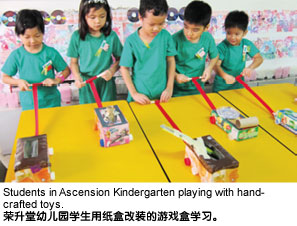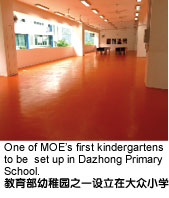 Children from low-income families will have priority in the 15 kindergartens to be established by the Ministry of Education (MOE). “We are giving priority admission for one-third of the places to children from low-income families. Having a good mix of family backgrounds is important to help children from different socio-economic backgrounds interact with one another.”
Children from low-income families will have priority in the 15 kindergartens to be established by the Ministry of Education (MOE). “We are giving priority admission for one-third of the places to children from low-income families. Having a good mix of family backgrounds is important to help children from different socio-economic backgrounds interact with one another.”
Mrs Loke-Yeo Teck Yong, Director, Education Services, MOE revealed this to EduNation in an e-mail interview.
“MOE is planning to set up 15 pilot kindergartens for five- to six-year-olds in the next few years, which will first and foremost provide a quality education that is affordable to all Singaporeans. MOE will also share the teaching and learning resources developed in the process with other pre-school operators to help catalyse quality improvements in the industry,” added Mrs Loke-Yeo.
 “The MOE kindergartens will be located in HDB (Housing Development Board) heartlands in different parts of Singapore and each location has a good mix of housing types within the vicinity to facilitate access to children from a wide range of family backgrounds. One-third of the children will come from low-income families. Having a good mix of family backgrounds is important to help children from different socio-economic backgrounds interact with one another. MOE is also exploring the provision of childcare services for MOE kindergartens and will inform parents of the details when ready. “The MOE kindergartens will be located in HDB (Housing Development Board) heartlands in different parts of Singapore and each location has a good mix of housing types within the vicinity to facilitate access to children from a wide range of family backgrounds. One-third of the children will come from low-income families. Having a good mix of family backgrounds is important to help children from different socio-economic backgrounds interact with one another. MOE is also exploring the provision of childcare services for MOE kindergartens and will inform parents of the details when ready.
“As this is the first year that MOE is enrolling children into the pilot kindergartens, the number of applications we have received is a good start. It will allow time for review and refinement of the programme to ensure that it best meets the needs of our children.
“Undergirding our curriculum and its delivery is our belief that children are active, curious and competent learners. A good quality pre-school programme is therefore one that emphasises the holistic development of a child, nurtures positive attitudes towards learning, and develops foundational literacy, numeracy and social skills. These attitudes and skills prepare a child for future learning. The revised Kindergarten Curriculum Framework by the MOE is based on these principles, and provides guidance on creating learning experiences which do not overload the child with academic knowledge beyond what is appropriate for the child’s developmental needs. The framework also contains a set of learning goals that establish what children should know and be able to do at the end of Kindergarten 2 to ensure a smooth transition to Primary 1.
“The five kindergartens set to start next year will have a strong emphasis on language learning for children to develop listening and speaking skills which will facilitate their language learning in later years. In addition to the English Language, the Chinese, Malay and Tamil languages will also be used as mediums of instruction,” concluded Mrs Loke-Yeo.
The curriculum will adopt an integrated approach by engaging children in learning through themes and projects as well as through purposeful play, music and movement, and outdoor activities. Children will also spend a few weeks in the year working together on projects to explore and find out more about things they are interested in.
|